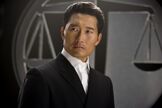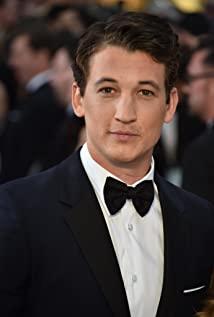Of course, talking about universal values in the shell of a cartoon like "The Return of the Great Sage" is indeed surpassing, and it is not a lesson. But I have always been loose, and I write it down when I think of it. This is my habit. No one can stop me if I don't vomit. And no one has ever ruled that film reviews can't talk about things other than movies. Today, let's talk about "Divergent 2: The Jedi Strikes Back", because the theme of the movie can be reminiscent of the topic of universal value, just to talk about it, it is a coincidence, and it is also a response to the brainless angry youth.
First of all, although the plot of "Divergent 2: The Jedi Strikes Back" is somewhat protracted, it is overall superior to "Divergent: Heterogeneous Awakening". It is a good upgrade, with complicated plots and a more advanced theme.
You know, the entire Divergent series is a dystopian story. The so-called utopia is an ideal country, the ultimate society imagined by human beings, where there is no false and ugly side, only the good, the good and the beautiful, such as friendship, honesty, selflessness, fearlessness, and erudition. These qualities are the ultimate pursuit of goodness in human nature, and it is rare to be able to keep one of them in one's life. The utopian society in "Divergent" is constructed accordingly. It virtualizes a future country that exists in the future Los Angeles, where people are divided into different factions according to their personal qualities, belonging to the friendly faction, the honest faction, Selfless faction, fearless faction, erudite faction, the whole society is also composed of five factions, all of them live in harmony and build a harmonious society. The erudite faction is currently in power, and the selfless faction was before. Since people are divided into groups and each has its own affiliation, Jenny, the leader of the erudite faction in power, believes that everyone must be within their own attributes and factions, and cannot be surpassed. If anyone has different attributes at the same time, they cannot be attributed to a certain one. Among the group, he is a disagreement, a violation of social order, and a troublemaker, and should be eradicated. The way to eradicate is to kill. In an ideal society, there is actually killing, which is very different from the ideal and embarrassing the real utopia. From then on, the story of the film begins, re-examining the society from the perspective of those who disagree, and gradually revealing that those who disagree are not only troublemakers, but problem solvers. The whole story contrasts the ideal beauty with the filth of real human nature. From the perspective of human nature, it overturns the falsehood of utopia and deduces an extraordinary dystopian story.
The so-called utopia (ideal country) is often a country that realizes universal values. At present, the word "universal value" has become a stigmatized word in the Chinese dynasty. In fact, it is a free translation of "universal value" in English, and it is more accurate to translate it as "universal value". In the humanities such as philosophy, universal values generally refer to those values that transcend religion, country, and nation, regardless of field, and are derived from human conscience and rationality. It includes concepts such as justice, justice, freedom, human rights, democracy, and the rule of law, as well as benevolence, faith, righteousness, and filial piety. Since it is universal, there is no distinction between benevolence and faith in the East and human rights and the rule of law in the West, nor between the democracy and freedom of capitalism and the harmony and prosperity of socialism. Any modifier is unnecessary. It should be suitable for our country. The north is suitable for the south, and it is suitable for both China and foreign countries. There is only a difference in the degree of development. There is a problem of more and less, not of having and not having. Without the division of socialist democracy and capitalist democracy, democracy is democracy, freedom is freedom, and benevolence is benevolence. There is only one kind of benevolence in the world. The Chinese make the Westerners the same, and it is the common property of all mankind. There has never been anything mysterious, it's just that we complicate it ourselves, plant fences, draw the ground as a prison, tie ourselves up, and coat the universal idea, dividing it into East and West, into capitalism and capitalism. socialism, and rejecting the spread of some ideas. This is an act of deceiving oneself and deceiving others, and it is also a short-sighted act that will eventually be discarded by history. In the future of the world, we hope to see the benevolence and faith that originated in the East spread throughout the world, and we hope that democracy and freedom originating from the West can also spread throughout the world, so that everyone can share and realize the world harmony.
In fact, when we are still entangled in whether there is universal value or not, others in the West are already reflecting on the problems after universalization. Moreover, they are not reflecting on the concept of democracy and freedom, but on the more oriental concepts of friendship, honesty, and selflessness. In the Los Angeles utopia in "Divergent 2: The Jedi Strikes Back", the Fearless became a group with courage and no brains, and was used by the erudite to attack dissidents; the honest pursued the absolute truth and refused to exist in the gray area, only to find that The naked truth will only expose pain and privacy; the friendly faction advocates unprincipled friendship, and when the flames of war come, they still sit back and watch their friends be hunted and killed; I still want to keep the world tied up in simple social relationships so that I can control it. The erudite Jenny ruling society is achieved by means of violence and bloodshed, which is not only unsatisfactory, but simply barbaric. In addition to the five factions of society, in addition to those who disagree, there is also a non-sectarian human being. Their rebellion against Jenny is almost the same as that of the erudite faction. It is still violent. Compared with Jenny, it is only the AB side of the coin. . The beautiful qualities of the five factions have all become ironic words in the end, bringing not ultimate justice, but new harm.
A simplistic and ideal utopia cannot become the ultimate belonging of human beings. The collective ideal cannot offset the selfish nature of the individual. When the dark human nature begins to burn, the collective rationality will become a poor background. What is the Dystopia about the Divergent series about? The answer is given in "Divergent 2: The Jedi Strikes Back", that is, instead of simplifying society, it should be integrated, society should be diversified instead of simplification, seek dynamic balance rather than simple and rude artificial division, and have different endowments The existence of the dividers is not only not a troublemaker in society, but a melting agent between different factions of society.
Tris, played by Shailene Woodley, is a Divergent, from the great escape from being hunted down in Divergent: Awakening of the Alien, to the discovery of self-knowledge in Divergent 2: The Jedi Strikes Back, and gradually Exposing the falsehood and absurdity behind the utopian society, from the edge to the center, completed the absolute counterattack of a youthful diaosi. To put it bluntly, it is also a youth inspirational film.
As American youth films, "The Divergent", "The Hunger Games" and "Maze Runner" have all carried out profound reflections on society from the perspective of teenagers. Although this reflection is full of absurdity, it is different from domestic youth films such as "Little Times". Compared with the series and "Gardenia Blossom", I don't know how high the level is. We are sincerely happy for the innovation of "The Return of the Great Sage" and "Monster Hunt", because they are really good at their level and have formed a breakthrough compared with similar domestic films. This is a vertical ratio, but if you compare it horizontally, it immediately looks shabby, too young too simple, sometimes naive. Especially the torturous youth films are still favored by capital and will become mainstream in the next few years. In this case, it would be really embarrassing to look at Hollywood youth films like "Divergent". In fact, "Divergent" is nothing more than a second-class production, not a good work. But even with such a lame person, it is still very obvious to compare with our champion. Alas!
Come on! Let's take a few more "The Return of the Great Sage" and "Monster Hunt" to refresh yourself. First get in touch, make up for the deficiencies, and then go further and continue to innovate. When that day comes, it will be the world of Chinese films.
View more about The Divergent Series: Insurgent reviews











